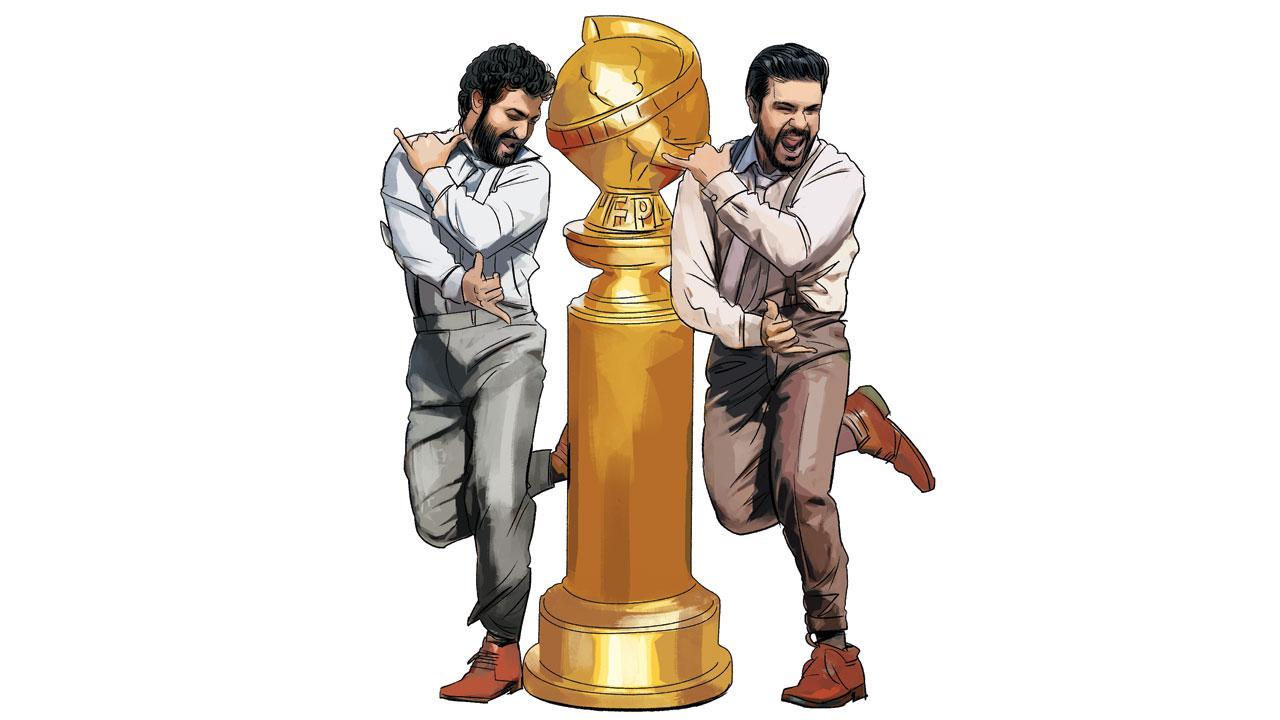Then what was the point of the 80th Golden Globes doubling its voters worldwide, as part of its diversity, equity and inclusion reform? Talent can come from anywhere

Illustration/Uday Mohite
![]() I’ve just been through one of the most challenging periods of my working life: being a Golden Globes International Voter. Sure, it is a privilege being the only Indian voter invited from 103 new voters in 62 nations. But it is also very rare to have to watch 345 feature films for an award. What?! Yes, 345 films—in about two months. But that wasn’t all: as South Asia Delegate to the Berlin Film Festival, I was already considering about 250 films for the festival, including 226 submissions. Together, I was looking at a list of about 600 films—phew! Six. Hundred. Films. Let that sink in. Of course, that’s impossible.
I’ve just been through one of the most challenging periods of my working life: being a Golden Globes International Voter. Sure, it is a privilege being the only Indian voter invited from 103 new voters in 62 nations. But it is also very rare to have to watch 345 feature films for an award. What?! Yes, 345 films—in about two months. But that wasn’t all: as South Asia Delegate to the Berlin Film Festival, I was already considering about 250 films for the festival, including 226 submissions. Together, I was looking at a list of about 600 films—phew! Six. Hundred. Films. Let that sink in. Of course, that’s impossible.
But because I’m also a filmmaker—not sure you’re aware, I’ve worked on 15 films and TV series, including directing Looking for Amitabh, a documentary short—I went all out to see as many films as I could. I was barely sleeping a few hours each night for two months: it was an incredible endurance test—of film.
After our first round of voting for nominations in 14 categories, I was concerned that many of the top prizes were still mostly cornered by big Hollywood studios. For instance, the Best Motion Picture-Drama nominations went to The Fabelmans (Universal), Avatar: The Way of Water (Walt Disney), Top Gun: Maverick (Paramount), Tar (Focus Features) and Elvis (Warner Bros). Then what was the point of the 80th Golden Globes doubling its voters worldwide, as part of its diversity, equity and inclusion reform? Talent can come from anywhere.
But fortunately, after our votes for the Golden Globe winners were counted, I was absolutely thrilled that 71 per cent of the winners—or 10 winners out of the 14 film categories—were non-Americans or Americans of other nationalities, so the diversity and inclusion reform had a measurable outcome. Of course, Steven Spielberg’s The Fabelmans won both Best Director and Best Motion Picture-Drama (Universal Pictures). But just look at what the rest include: Cate Blanchett (Australian) won Best Actress-Drama for Tár; Michelle Yeoh (Malaysian) won Best Actress-Musical/Comedy and Ke Huy Quan (Vietnamese-American) won Best Supporting Actor—both for Everything Everywhere All at Once; Angela Bassett (African-American) won Best Supporting Actress for Black Panther: Wakanda Forever; The Banshees of Inisherin/ Searchlight Pictures written and directed by Martin McDonagh (British, of Irish origin) swept three awards—Best Musical/Comedy, Best Screenplay and Best Actor-Musical/Comedy for Colin Farrell (Irish); Guillermo del Toro (Mexican)/Netflix won Best Animated Motion Picture for Pinocchio, Santiago Mitre’s Argentina, 1985 (Argentina)/ Amazon Prime Video won for Best Non-English Motion Picture (where SS Rajamouli’s RRR had a nomination), and of course music composer MM Keeravani and lyricist Chandrabose (India) won Best Original Song for RRR’s Naatu Naatu. The Golden Globes seem to have redeemed themselves.
In fact, MM Keeravani and Chandrabose won Best Original Song—sung by Rahul Sipligunj and Kaala Bhairava in Telugu—over Rihanna, Lady Gaga, Taylor Swift and Alexandre Desplat. Take a moment to process that. Wishing RRR all the best for its onward Oscar and BAFTA journeys. As a number of Marvel Studios directors have publicly supported RRR in its awards campaign, there is speculation that SS Rajamouli may collaborate with Marvel Studios in future. Fingers crossed!
Meenakshi Shedde is India and South Asia Delegate to the Berlin International Film Festival, National Award-winning critic, curator to festivals worldwide and journalist.
Reach her at meenakshi.shedde@mid-day.com
 Subscribe today by clicking the link and stay updated with the latest news!" Click here!
Subscribe today by clicking the link and stay updated with the latest news!" Click here!








